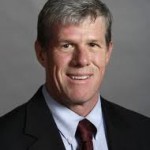
by Steven Waechter | Nov 28, 2012
 The tax credit for wind energy is back on the agenda, and Iowa’s own Chuck Grassley and Terry Branstad are taking leadership roles in fighting for the extension, going so far as to appear together at a press conference about it.
The tax credit for wind energy is back on the agenda, and Iowa’s own Chuck Grassley and Terry Branstad are taking leadership roles in fighting for the extension, going so far as to appear together at a press conference about it.
Wind energy is my favorite target at the moment, because it combines socialist economics, corruption, aesthetic vandalism, junk science, and cynical political machinations – all melting together into a hideous soup of wasted money and ruined skylines.
Tough Love
After the last election, targeting two of Iowa’s best known Republicans for criticism is perhaps a risky business, but for those who think I – with my dislike of leftists – shouldn’t be doing it, I offer the following historical analogy:
In the days of the Roman legions, the centurions were legendary for their swift discipline. One centurion developed a habit of breaking his staff over the backs of soldiers who had acted disobediently. “Give me another,†he would say to his aide when it happened, and it happened so often that “give me another“ became his nickname . In this way, withering cruelty became not a malicious attempt to destroy, but deep concern for long-term wellbeing.
Well, give me another.
Political Venture Capital
Wind energy is an odious political scam. First of all, the industry cannot survive without government subsidy, namely, the tax credits. The wind industry makes profits not from the power grid, but from their tax returns.
It is also ridiculously expensive and underproductive. When Alliant Energy built the Whispering Willows wind farm in Franklin County, they petitioned utilities regulators for a rate hike to help cover the cost. The market had reached a price for electricity, generated by coal, but at that price the wind farm was not economically viable – it wouldn’t produce enough electricity to cover its cost.
They built it anyway. Even though the money in the wind industry is earned on the tax return and not the power grid, they didn’t want to eat an operating loss, so rates have to increase. Consumers in central Iowa found themselves paying more money for the electricity they used – still mostly generated from coal – to pay for a wind farm erected so the utility could earn a tax credit.
The utility sells the power and claims the credits; the landowners earn fees for having these modern art sculptures on their land; the turbines produce just enough electricity to power a massive, metaphorical conveyor belt carrying money from the pockets of poor customers to the rich and the politically-connected… Because that is progress these days.
Grassley stated at the recent news conference that “We have a 20 year investment in this… it would be terrible to throw a way a 20 year investment if it will mature in a short time.â€
We have been waiting for the wind energy industry to mature since the days when pioneer farmers could order a windmill from the Sears and Roebuck catalog. Most of them were dismantled after rural America was electrified. Now, the fantasy is that the same technology that was felled by electricity will be the future of electricity.
Central Dreaming
Nothing becomes outdated faster than a fantasy about the future. This is never more true than when the fantasy has its birth in the minds of politicians; a future brought to you by the same people who bring you inflation, wars, and prisons.
The general public is also rapidly becoming too poor to cover higher utility bills, but wind energy fits into the political rhetoric of our time and so they charge forward. Wind energy doesn’t make power cheaper, reduce our trade deficit, strengthen the dollar, or generate tax revenue – but it can get you elected.  It employs only a handful of people, especially when compared to the coal industry – which politicians have threatened to kill. The turbines themselves are insanely ugly, and provide a far too convenient backdrop for political photo opportunities.
I understand that this is politics. I also object to the fact that this is politics. The experience of subsidized public housing should have been enough to dispel the urge to make fantasy into reality, but it wasn’t. We will all pay the price. Literally.

by | Nov 27, 2012
 ((This is second installment of a 2 part piece, to start with Part 1 click here))Â
((This is second installment of a 2 part piece, to start with Part 1 click here))Â
In the end, where we failed was to reach what is popularly called the Low Information Voter. These are voters who for whatever reason get very little to no political information, and what they do get is confined to a very narrow set of media vehicles. By targeting local news and other prime listening/watching avenues, the Democrats were successful in reaching those voters, supplemented by their usual other logistical operations of doorknocking, calling, and absentees.
We did quite a bit better this time on the logistical side with doorknocking, calling, signs, and candidate events. The Victory centers, though not perfect, were an improvement on the past. I believe we can build on that by better coordination with the county central committees and their individual headquarters operations. I believe this will be possible primarily by getting as early of a start as possible in the 2014 election cycle, and begin coordinating our logistical effort, as well as raising the necessary funds within the same timeline to support those efforts.
A big area that helped us was absentees. Republicans have greatly improved on their game from even ten years ago, when Democrats would be the vast majority of absentee votes. Though they are still ahead, Republicans largely narrowed that lead in 2012. We can build on that success in 2014 to get even more marginal GOP voters to cast a ballot in our GOTV operations.
One factor that hurt us in a big way was that the top ticket in Mitt Romney had short to no coattails. Though it didn’t seem to effect incumbents much, any challenger or newcomer in an open seat, from a preliminary analysis of the numbers, was drug down as voters seemed to vote the downticket to the supervisor level in line with their vote in the presidential. This will not be an issue so much in the mid-terms, at least for the state races, particularly if Governor Branstad would run again.
We also had a difficult time competing with money. We always have structural problems in this area due to the usual suspects of Democrat contributing groups, especially the unions, but part of this was from to the unpopularity in the leadership change of the Republican Party of Iowa. They simply were not in the game, leaving the heavy lifting to be done by the PACs and the Legislative Majority funds as well as the local entities and the campaigns themselves. It is necessary I believe that we have all entities engaging in 2014, and make whatever changes necessary at the leadership level to ensure that we have all the assets we can have helping us to win the mid-terms. I believe better targeting will also use our funds in most efficient and effective way possible.
The best advice I can give to Iowa GOP activists wanting to gain more congressional seats, as well as winning a majority in the state senate, is to not dwell to long on our failures or disillusion ourselves with doom and gloom. Rather, properly analyze what went both right and wrong in 2012 and build on that, then go right back at them for 2014, and most importantly begin as soon as possible. We are not by any means out of the picture, and I believe control of both the legislature and governor is well within our grasp.

by | Nov 23, 2012
 Below is a brief overview of a bi-partisan initiative that is set to be brought to the floor of the Iowa Legislature when it gavels in next session. Once it is brought to the floor I will publish a more detailed look at it. As noted on Wednesday, Sen. Brad Zaun, Rep. Ako Abdul-Samad, and Rep. Kevin Koester have already signed on to support the measure and it will be interesting to see the reaction from both sides once the session starts.
Below is a brief overview of a bi-partisan initiative that is set to be brought to the floor of the Iowa Legislature when it gavels in next session. Once it is brought to the floor I will publish a more detailed look at it. As noted on Wednesday, Sen. Brad Zaun, Rep. Ako Abdul-Samad, and Rep. Kevin Koester have already signed on to support the measure and it will be interesting to see the reaction from both sides once the session starts.
———————————————————————————————
The Every Iowan Economic Empowerment Act or The Empowerment Act takes advantage of our state’s strengths in two ways.
I. Rewarding Hard Work & Sacrifice Provision
The first component of The Empowerment Act rewards the hard work and sacrifice of Iowans by eliminating taxation on overtime.
A. If an Iowan works an hourly or hourly jobs, after 40 hours state taxation ends. No hour worked over 40 hours is taxed whether that time is accrued at one job or a second or third job.
B. If an Iowan works a salaried position that consists of at least 40 hours per week as their primary job but works a second job that is either hourly or salaried that secondary employment will not be taxed by the state.
C. In a state with the highest per capita number of two working parent households, this rewards their sacrifice by allowing them as a household to keep more of the money they earn or allows one of the two to work less hours while the household brings home the same size weekly paycheck.
II. Capitalism & Working Class Iowa Empowerment Provision
The second component of The Empowerment Act returns to Iowans the ability to invest in and rebuild their communities while savaging rampant cronyism found in state and local gifting politics.
A. 5% Charitable Provision Each working Iowan gets 5% rebated from their individual state income tax bill and they can designate the non-profit organization or organizations of their choice to receive those funds.
B. 10% Rural Revitalization Provision Each working Iowan gets 10% rebated from their individual state income tax bill and they can designate the rural enterprise or enterprises of their choice to receive those funds.
C. 15% Entrepreneurship & Capitalist Empowerment Provision Each working Iowan gets 15% rebated from their individual state income tax bill and they can invest in any Iowa based business venture.
Implementation
1. Potential recipients for investment sign up as state vendors and provide relevant information such as their EIN, business organization charter, and banking information.
2. At tax refund time the state wires invested funds to the appropriate vendor not the taxpayer.
3. The taxpayer is responsible for vetting the investee and any collaborative efforts.
4. Demonstrable fraud is prosecuted as it would be under our current code.

by | Nov 21, 2012

Especially after the last two years of bitter political fighting in Iowa, when you hear an initiative is being co-championed by Rep. Ako Abdul-Samad, Brad Zaun and Kevin Koester–you take note.
Below is the full press release announcing this effort. Though we are closing down shop tomorrow for Thanksgiving, on Friday we will run a detailed look at the legislation so you can form your own thoughts on its merits.
————————————————————————————————————
FOR IMMEDIATE RELEASE: Tuesday, November 20, 2012
Contact:
Rev. Bobby Young, President
515-491-0905; [email protected]
Jonathan R. Narcisse, Advisor
515-770-1218; [email protected]
 Iowa Urban Initiative To Announce Economic Empowerment Act
On Wednesday, November 21 at 8:15 a.m. at Mt. Hebron Baptist Church, 1338 – 9th Street in Des Moines, the Iowa Urban Initiative will announce the Every Working Iowa Economic Empowerment Act or Empowerment Act campaign.
In addition to Pastor Bobby Young, President of the Initiative, a bi-partisan legislative effort will be headed by Sen. Brad Zaun (Rep.) of Urbandale who signed on to the effort this spring at an informational gathering for community leadership, Ast. Minority Leader Rep. Ako Abdul-Samad (Dem.) of Des Moines, Rep. Deborah Berry (Dem.) from Waterloo and Rep. Kevin Koester (Rep.) from Ankeny.
Other local and state activist are expected to be present also representing the political spectrum from those who were engaged in the Occupy movement to Tea Party leadership.
Statewide Campaign
Representatives Abdul-Samad and Berry will take the lead in promoting the Act statewide. Town Hall Forums will be held in Des Moines, Waterloo, Davenport, Cedar Rapids and Sioux City and a barnstorming media blitz will cover several communities throughout Iowa including Clinton, Dubuque, Burlington, Fairfield, Iowa City, Ottumwa, Marshalltown, Mason City, Ft. Dodge, Spencer, Council Bluffs, Ames, Storm Lake and Lee County.
Senator Zaun To Head G.O.P. Support
“The reason I am here today is to support an idea that is thinking outside the box. What we have been doing the past few decades has not been working. This is a method to empower every working Iowan – to reward people for their hard work and sacrifice; to reward Iowans by creating a way for them to invest back in their communities; to invest in their favorite non-profits; to invest in their churches and favorite organizations; to invest in rebuilding our small towns and rural Iowa; and to invest in small business and economic growth – in all 99 counties. This act will create accountability and take control from politicians and bureaucrats and put it back in the hands of the people where it belongs.”
With those words State Senator Brad Zaun (R) embraced Pastor Bobby Young, Chair of the Iowa Urban Initiative in announcing his support for the Every Working Iowan Economic Empowerment Act this spring.
Zaun stated that this Act represents not only the best of what Republicans stand for but a key to growing Iowa’s economy and population after years of decline. He especially praised the Acts shift from reliance on big government as the solution to returning power, hope and opportunity to every working Iowan.
Sen. Zaun, one of Central Iowa’s most popular and respected Republicans, was the party’s nominee for U.S. House District 3 in 2010 and is the former ranking member on the Iowa Senate’s Ways and Means committee. Zaun currently serves on the Senate’s Commerce, Rules and Administration, Transportation and Ways and Means committees and came to the Senate in 2005 after serving as Mayor of Urbandale, Iowa from 1998 to 2005.
A District In Need
“I feel this is the first step to addressing the economic needs of community – urban and rural. It gives people the opportunities to become self-sufficient and determine their own economic destiny,” stated Rep. Berry.
Berry, a former member of the Waterloo City Council, serves perhaps Iowa’s most urban district when poverty, academic woes, health disparities and rampant violence are factored in.
“Most Iowans, including our legislators and governor, can even comprehend the dire condition of this district and the plight of urban Iowans. This Act is a powerful remedy to the pain and needs we face.”
She currently serves on the Iowa House Local Government, Public Safety, Veterans Affairs committees and the Health and Human Services Appropriations Subcommittee.
We Can End Poverty
“For most of my life schemes have been introduced to revitalize urban Des Moines and urban Iowa. In Des Moines we do not see the impact of a quarter billion in federal funds on a still blighted “Model Cities” community. We do not see the benefit of trickle down economics. What we find instead is that 70% of the families with children in the Des Moines School District, our state’s largest, can not feed them without the government putting food on their table,” stated Rep. Abdul-Samad.
“This Act is vital on a number of levels,” stated Rep. Abdul-Samad whose district is in comparable shape to Rep. Berry’s.
“First it grows the Iowa economy from the ground up. Again, trickle down economics has not worked in our state. It helps small businesses with workers and capital. It helps working families retain and invest their earnings. And, it provides vital resources to those serving communities in all 99 counties; to key rural revitalization initiatives and to business ventures at every level. Finally, this Act has the potential to end poverty in Iowa. Republicans and Democrats must join together in getting this legislation passed and starting the reconstruction of our state.
Addition of Rep. Koester
“We are honored to have Rep. Koester join this effort,” stated President Young. Many Iowans are suffering. Urban Iowans are especially struggling. The addition of Rep. Koester demonstrates that this truly is a bi-partisan initiative that will help Iowans in all 99 counties. We look forward to securing the 51 votes in the House and the 26 votes in the Senate to get this to the governor’s desk,” stated President Young.
![Predictions for the Next Four Years (Part 1 of 2)]()
by Steven Waechter | Nov 14, 2012
 Well, Barack Obama will be President for a second term. It is now time to take a look around, and prepare for what is likely to happen next. Based on my observations and what I’ve learned over the years, these are my predictions:
Well, Barack Obama will be President for a second term. It is now time to take a look around, and prepare for what is likely to happen next. Based on my observations and what I’ve learned over the years, these are my predictions:
No Housing Recovery
Commentators have been calling the bottom of the housing market – and screaming with increasing urgency that it was time to buy – since 2007. The Fed has cut interest rates to nearly zero, and through quantitative easing has flooded the financial system with new money. This will continue for the near future, especially since QE-infinity was announced earlier this year. There remains no recovery in the housing market, and there won’t be a recovery.
Bad monetary policy has left the productive bits of the economy in an absolute shambles, and now there simply aren’t enough jobs to allow a recovery in the housing market. This will get worse, not better.
Mass Layoffs
This one will happen sooner rather than later. In an economy that is as sedate as ours the likelihood of reduced unemployment is already pretty slim, and if you consider the looming Obamacare mandates, tax hikes on income, dividends, and capital gains, as well as another four years of an administration that has a penchant for change (breeding uncertainty), I predict that there will be large job losses coming in the very near future.
Growing Poverty
This one seems to fall into place as well, especially for those laid low by the layoffs which I think are coming. But, even those who keep their jobs will experience marked decreases in their standard of living. In an economy where consumption is king and production – or any sort of value-added economic activity – is outsourced, taxed, regulated, or outright banned, the remaining employment opportunities take on a sort of wistful irrelevance. Many will be nominally employed, but at the same time wholly unable to support themselves, let alone able to assemble savings.
Spike in Utility Rates
All forms of energy are likely to get more expensive over the next four years. Obama has explicitly stated that he intends to bankrupt the coal-generated electricity industry in favor of renewable energy kitsch which can only be financially feasible with massive increases in electricity prices. Expect some coal plants to be shut down in the next term, and expect to pay far more for electricity.
High Prices for Oil and Grain
In a past article, I pointed out that since 1990, the United States has run trade deficits in excess of $9 trillion. This despite the fact that in 1990 the supply of dollars (the M2 metric) was only $3 trillion. In an economy where we can buy foreign goods by printing money, there is no reason to manufacture much of anything. This dynamic will continue for the time-being, and we will import shiploads of consumer goods and pay for it with nothing but inflation. This will lead to even higher prices for oil and grain, which are inflation-sensitive commodities whose production cannot be outsourced.
Feeding grain to livestock is a value-added activity, however, and in an inflationary economy the price of grain will go up, and the ability of the public to buy meat will be reduced, so I am predicting a continued decrease in the number of farmers who bother to raise livestock, as well as a decline in the overall size of the livestock herds in the country.
College Tuition Spikes; Enrollment Begins to Fall
Obama’s attempts to reform the student loan industry had nothing to do with controlling the costs of college. The government runs most of the student loan industry, and interest rates have been kept very low for Federal loans. This is all designed to get more kids into college, regardless of what it costs, and with no real limit to the amount of credit available to the college-bound, there are no incentives for colleges to control costs.
The luster has begun to rub off of the whole college experience in my estimation. A college degree has become little more than a very expensive lottery ticket, and new college graduates will not see any discernable increase in their employment opportunities, incomes, or future prospects.
Even with the endless propaganda urging kids to attend college, the decision to attend college will not make financial sense for a large number of American kids, and we will begin to see a decline in enrollments, especially in full-time, traditional enrollments.
((To Continue Reading, Click Here To Go Straight To Part 2))
The post Predictions for the Next Four Years (Part 1 of 2) appeared first on The Conservative Reader.
![Predictions for the Next Four Years (Part 1 of 2)]()
by Steven Waechter | Nov 13, 2012

(This is Part 2 of a 2 Part Series– To Start With Part 1 Click Here)
Dollar Under Strain
There are so many dollars floating around out there, and so little American production for those dollars to chase, eventually foreign central banks will get wise and look to divest. At some point, that trickle could turn into a flood, and result in a dollar run. If that happens, life in America will be rather bleak for a time.
Police State
Obama has consistently lied about his civil liberties stances; campaigning against the Patriot Act and then supporting the renewal, and promising to veto the National Defense Authorization Act, and then signing it. There is no reason to believe he will change course now.
A proliferation of traffic cameras is in my view as predictable as the summer solstice, and I imagine even leftists who believe the government can manage an economy will agree with my prediction that more traffic cameras will be installed across the country. This one has little to do with Obama, but as the economy falters, expect local governments to do anything in their power to claw revenue from the populace. Pay up you filthy peasants!
Rand Paul Rising
It is my expectation – as well as my personal hope, in full disclosure – that Rand Paul will rise further in political influence. Senator Paul from Kentucky will likely become the main leader of the libertarian faction of the Republican Party, upon the retirement of his father from the House at the end of this year.
Within Republican circles there are many who dislike the libertarian faction; indeed, libertarians tend to dislike the war on drugs, military intervention, and social entitlements. This tends to make the Republican establishment both irritated and nervous about their feasibility in elections.
In the near future we will not be able to afford the sacred cows which are held as critical in our current political discourse. There is going to be a movement of dissent, and as things get worse on all fronts, this movement will gain further sympathy.
Best Advice
People often get after me about being filled with gloom, and having no real solutions in mind. Those people often define the term “solution†as plan to preserve the status quo. Change, much like Perestroika, is defined along similar lines.
My best advice is to learn how to do something for yourself. I have been perfecting my recipe for buttermilk pancakes for example. I have an urge to learn how to make my own shoes, but I almost certainly lack the artistic skill necessary.
Politically, I would urge you to start going to your local government meetings and complaining about things that irritate you while you are there. Smart Growth zoning policies irritate me, but I live in an unincorporated area, so my vengeance must be preserved for another issue.
Also, there is never a bad time to buy a gun.
The post Predictions For The Next Four Years (Part 2 of 2) appeared first on The Conservative Reader.


by | Nov 13, 2012
 In case anyone hasn’t seen this yet the article below is well worth giving a read. It has been making the rounds recently (first saw on John Deethe’s blog), and is a stunning first-hand account of a Mitt Romney volunteers unfortunate experience on Election Tuesday. I don’t have any reason to doubt this story, and perhaps some of the turnout failure for the Republican nominee can be explained by situations like this occuring across the country…
In case anyone hasn’t seen this yet the article below is well worth giving a read. It has been making the rounds recently (first saw on John Deethe’s blog), and is a stunning first-hand account of a Mitt Romney volunteers unfortunate experience on Election Tuesday. I don’t have any reason to doubt this story, and perhaps some of the turnout failure for the Republican nominee can be explained by situations like this occuring across the country…
—————————————————————————————————
(Via Website – Ace of Spades HQ)
November 08, 2012
The Unmitigated Disaster Known As Project ORCA
What is Project Orca? Well, this is what they told us:
Project ORCA is a massive undertaking – the Republican Party’s newest, unprecedented and most technologically advanced plan to win the 2012 presidential election.
Pretty much everything in that sentence is false. The “massive undertaking” is true, however. It would take a lot of planning, training and coordination to be done successfully (oh, we’ll get to that in a second). This wasn’t really the GOP’s effort, it was Team Romney’s. And perhaps “unprecedented” would fit if we’re discussing failure.
The entire purpose of this project was to digitize the decades-old practice of strike lists. The old way was to sit with your paper and mark off people that have voted and every hour or so, someone from the campaign would come get your list and take it back to local headquarters. Then, they’d begin contacting people that hadn’t voted yet and encourage them to head to the polls. It’s worked for years.
From the very start there were warning signs. After signing up, you were invited to take part in nightly conference calls. The calls were more of the slick marketing speech type than helpful training sessions. There was a lot of “rah-rahs” and lofty talk about how this would change the ballgame.
Working primarily as a web developer, I had some serious questions. Things like “Has this been stress tested?”, “Is there redundancy in place?” and “What steps have been taken to combat a coordinated DDOS attack or the like?”, among others. These types of questions were brushed aside (truth be told, they never took one of my questions). They assured us that the system had been relentlessly tested and would be a tremendous success.
On one of the last conference calls (I believe it was on Saturday night), they told us that our packets would be arriving shortly. Now, there seemed to be a fair amount of confusion about what they meant by “packet”. Some people on Twitter were wondering if that meant a packet in the mail or a pdf or what. Finally, my packet arrived at 4PM on Monday afternoon as an emailed 60 page pdf. Nothing came in the mail. Because I was out most of the day, I only got around to seeing it at around 10PM Monday night. So, I sat down and cursed as I would have to print out 60+ pages of instructions and voter rolls on my home printer. Naturally, for reasons I can’t begin to comprehend, my printer would not print in black and white with an empty magenta cartridge (No HP, I will never buy another one of your products ever again). So, at this point I became panicked. I was expected to be at the polls at 6:45AM and nothing was open. I was thankfully able to find a Kinko’s open until 11PM that was able to print it out and bind it for me, but this is not something I should have had to do. They expected 75-80 year old veteran volunteers to print out 60+ pages on their home computers? The night before election day? From what I hear, other people had similar experiences. In fact, many volunteers never received their packets at all.
At 6:30AM on Tuesday, I went to the polls. I was immediately turned away because I didn’t have my poll watcher certificate. Many, many people had this problem. The impression I got was this was taken care of because they had “registered me”. Others were as well. But apparently, I was supposed to go on my own to a Victory Center to pick it up, but that was never communicated properly. Outside of the technical problems, this was the single biggest failure of the operation. They simply didn’t inform people that this was a requirement. In fact, check out my “checklist” from my ORCA packet:

Notice anything missing? My guess is the second “Chair (if allowed)” was supposed to be “poll watcher certificate” but they put chair twice. This was an instruction packet that went out to 30,000+ people. Did no one proof-read it?
So, I headed back home to see if I could get my certificate. I called their official help line. It went unanswered. I tried their legal line. Same thing. I emailed them. No response. I continued to do this for six straight hours and never got a response. I even tried to call three local victory centers. All went straight to voicemail.
While I was home, I took to Twitter and the web to try to find some answers. From what I saw, these problems were widespread. People had been kicked from poll watching for having no certificate. Others never received their pdf packets. Some were sent the wrong packets from a different area. Some received their packet, but their usernames and passwords didn’t work.
Now a note about the technology itself. For starters, this was billed as an “app” when it was actually a mobile-optimized website (or “web app”). For days I saw people on Twitter saying they couldn’t find the app on the Android Market or iTunes and couldn’t download it. Well, that’s because it didn’t exist. It was a website. This created a ton of confusion. Not to mention that they didn’t even “turn it on” until 6AM in the morning, so people couldn’t properly familiarize themselves with how it worked on their personal phone beforehand.
Next, and this part I find mind-boggingly absurd, the web address was located at “https://www.whateveritwas.com/orca“. Notice the “s” after http. This denotes it’s a secure connection, something that’s used for e-commerce and web-based email. So far, so good. The problem is that they didn’t auto-forward the regular “http” to “https” and as a result, many people got a blank page and thought the system was down. Setting up forwarding is the simplest thing in the world and only takes seconds, but they failed to do it. This is compounded by the fact that mobile browsers default to “http” when you just start with “www” (as 95% of the world does).
By 2PM, I had completely given up. I finally got ahold of someone at around 1PM and I never heard back. From what I understand, the entire system crashed at around 4PM. I’m not sure if that’s true, but it wouldn’t surprise me. I decided to wait for my wife to get home from work to vote, which meant going very late (around 6:15PM). Here’s the kicker, I never got a call to go out and vote. So, who the hell knows if that end of it was working either.
So, the end result was that 30,000+ of the most active and fired-up volunteers were wandering around confused and frustrated when they could have been doing anything else to help. Like driving people to the polls, phone-banking, walking door-to-door, etc. We lost by fairly small margins in Florida, Virginia, Ohio and Colorado. If this had worked could it have closed the gap? I sure hope not for my sanity’s sake.
The bitter irony of this entire endeavor was that a supposedly small government candidate gutted the local structure of GOTV efforts in favor of a centralized, faceless organization in a far off place (in this case, their Boston headquarters). Wrap your head around that.
I’m on Twitter at @JohnEkdahl if you have any questions.
——————————————————————–

by | Nov 12, 2012
 The way TCR: Iowa set the table for the Iowa Senate’s 22 contested races was as follows: 9 races we predicted heavily favored one Party or the other, 8 races we predicted as leaning one way or the other, and 5 were deemed toss-ups.
The way TCR: Iowa set the table for the Iowa Senate’s 22 contested races was as follows: 9 races we predicted heavily favored one Party or the other, 8 races we predicted as leaning one way or the other, and 5 were deemed toss-ups.
The reason I was personally so bullish on a Senate takeover by Republicans was that if these predictions held Democrats would have had to run the table of the 5 toss-up races to keep control of the chamber. In the end, and impressively I might add, this is pretty much what they did. While most of my prognosticating here was accurate, they won victories in 4 of the 5 I deemed toss-ups and managed to flip one seat I had leaning Republican, the end result was not.
Looking For Answers
The best way to fix the problem the GOP had on Tuesday is to dissect what happened. We will have much more on this next week, when I will post a data chart, but for now let’s take the birds-eye view of the facts in the 4 toss-up contests Republicans lost and the one race where a “lean†Republican incumbent was upset.
The spending numbers below represent the cumulative amounts of money that were spent in each race by each side in the last 3 ½ months of the campaigns (July 19 to November 2nd). This includes the money the candidate raised and spent added to the number the Party spent for each ‘in-kindâ€. Since it is common practice for both sides to have the candidate donate large portions of their funds to their Parties, to spend both on their individual behalf and on other candidates the leadership feels could use it, I have gone through all the reports to subtract out this number. The result gives an accurate view of the actual dollars spent on the race (trust me it wasn’t a barrel of fun). Looking at the dollar amounts and the timing of ad buys for each side is very telling and we will break this down further later this week. For now here is the general overview.
SD 49— Naeve (R) defeated by Hart (D)
This race was an open seat due to no incumbent residing in the newly drawn district. It was a very tough district for Republicans but they had a great candidate who ran strong and should be commended.
Bottom Line= Naeve (R) was outspent by $84,000, faced a (D+3,721) registration deficit, and lost by 2,907 votes. Despite being outspent he cut into the registration advantage by 800—he was the only Republican in this list to beat the numbers.
SD 46— Hamerlinck (R) defeated by Chris Brase (D)
This was an incumbent Republican seat that I wrongly had projected to lean Republican. Republican Hamerlinck’s final report was not filed for some reason, but in the first filing he showed spending $30,000 on his own while the Party spent $30,000 for him. On the other side Brase (D) spent $330,000 on the effort. Very telling here is that of this total $259,000 in assistance came directly from the Democrat Party.
Bottom Line= It’s hard to say much on the Republican side without the last report filed, but on the Democrat side the story is a lot of money poured in to facilitate this upset. Between July 19th and October 19th Democrats spent $167,000 before throwing in an additional $157,000 in the final few weeks. The result in ballots cast ended up being a D+409 advantage turned into a 1,954 Democratic victory. Something tells me this ends up being a story of an incumbent hugely outspent and not being backed up with enough dollars from the Party.
SD 36— Jech (R) defeated by Sodders (D)
This was an uphill fight from the jump for Republicans, which many say started when Jech defeated former Senator Larry McKibben in the primary. The conventional wisdom was the Tea Party candidate Jech, who had already lost two runs at a House seat, was a far less formidable candidate than the Branstad backed McKibben. In the final 3 ½ months Jech impressively raised over a $100,000, but the GOP only threw in $46,000 total, including a miniscule $14,000 for the final push. Conversely, Democrats did not take Jech lightly, giving Sodders $358,000 in the final months.
Bottom Line= In the end Jech was outspent by $206,000 in an R+121 district, and she lost by 2,263 votes. There is a ton of interesting stuff going on here. At first glance you could explain away the GOP only giving Jech $46,000 by assuming she was polling poorly. The only problem with that is if she was there’s no way Democrats pump $224,000 to Sodders in the final two weeks. Clearly one Party had a bad read on this race, and it’s likely it was the Democrats. Since Sodders won by 2,263 votes it’s hard to believe he needed the near quarter-million dollars at the end. I tend to agree with the establishment that this race became too heavy of a lift with Jech as a candidate—even though she was badly outspent, it is still pretty amazing to have a 121 voter registration advantage going in and lose the election by well over 2000 votes.
Part 2 Upcoming
Later this week we will look at the other two painful Senate loses (SD 30 and SD 26), document some trends occurring in these five races, and then, finally, make some judgements on what could have been done differently  The ultimate goal here is not to call any particular person or organization out—the goal here is to identify the shortcomings so they can be corrected. Ironically it appears that two years from now Senate Republicans will be in the exact same spot of needing to flip two seats for control.
If a better effort and strategy are not employed—the brutal result will surely be the same.
((To Go Straight To Part 2 Click Here))

by Art Smith | Nov 9, 2012
 Tonight was a night for Central Iowa Republicans to bounce back from Tuesday’s less than exciting election results. Â Due to the passing of Pat Ward (whose loss was felt and reflected on tonight several times), Republicans needed to nominate a new candidate to run against Desmond Adams on December 11.
Tonight was a night for Central Iowa Republicans to bounce back from Tuesday’s less than exciting election results. Â Due to the passing of Pat Ward (whose loss was felt and reflected on tonight several times), Republicans needed to nominate a new candidate to run against Desmond Adams on December 11.
The special convention called to make the nomination select attorney and West Des Moines City Councilman Charles Schneider.
Six people ran. Â The other five were Clive Mayor Scott Cirksena, Republican Activist Connie Schmett, Valley High School History Teacher Greg Hanson, Pat’s husband John who is an attorney, and former Waukee City Councilman Isaiah McGee.
You can see my twitter comments here. Â Kevin Hall at TheIowaRepublican.com live blogged here.
The convention was a bit of a challenge from a vote counting standpoint because voting in these conventions is, according to state law, done proportionally based on the number of Republicans that voted in the last general election, which for this seat was in 2008. Â Redistricting after the 2010 census created a situation where determining how those votes fell into the existing precincts would be impossible, so each precinct got a voting weight of 1. However, since each precinct had different numbers of delegates, one with 7 apparently, each delegate got a portion of the 1 vote for their precinct. Â So the numbers in the first ballot had fractions, and the second had decimal points.
There was only one motion brought from the floor, which was a request before the balloting to disqualify both Schneider and Ward because (as I grasped the delegate’s comments) as lawyers they are beholden to the Iowa Supreme Court. Â The specific section of the Iowa Constitution that he was referring to is Article III, section 22:
Disqualification. Section 22. No person holding any lucrative office under the United States, or this State, or any other power, shall be eligible to hold a seat in the General Assembly: but offices in the militia, to which there is attached no annual salary, or the office of justice of the peace, or postmaster whose compensation does not exceed one hundred dollars per annum, or notary public, shall not be deemed lucrative.
It was clearly a stretch understanding of the text, and the chairman quickly ruled the motion out of order.
Each ballot took about 25 minutes between voting and counting. Â I was expecting to have at least 3 ballots before having a winner declared. Â All six candidates are highly qualified and are well respected in the community. Â Reaching a decision in two ballots was both a surprise and a relief … wrapping up by 9:00 PM meant I could get home at a decent hour!
The most encouraging part of the evening was listening to everyone with a positive attitude about moving on from Tuesday’s losses. Â Although winning Senate District 22 will not swing the balance of power to Republicans in the Iowa Senate, it does move the party one step in the direction of building a majority in 2014. Â If Republicans are successful at winning this seat, it has the potential to create long-term momentum.
This will be a hard race. Â As I mentioned in a previous post, the Democratic opponent, Desmond Adams, is a strong personality and tells a compelling story. Â Look for Desmond to work this campaign from a moderate position.
~ ~ ~ ~ ~
As an aside, I met Charles Schneider while I was working in my garden one summer’s day in 2007. Â He was walking the ward to introduce himself as a candidate. Â He impressed me that day, and I’ve spoken with him a number of times since and have sought his help on a few city related issues. Â He’s always had time for me, always friendly and does everything he can to ensure his constituents are getting the level of attention they need. Â He has a lot of people’s respect in West Des Moines, and I hope he does well in the special election on December 11.
It was good to see and chat with Kevin Hall from TheIowaRepublican.com, Gary Barrett from WHO Radio, and Bill Petroski from The Des Moines Register.  Bill will be covering the Iowa Senate this coming session.
I also got to spend some time with former Polk County Republican Party Chairmen John Bloom and Ted Sporer, David Fischer from the Campaign for Liberty, my Statehouse Representative Chris Hagenow, State Senator Jack Whitver, Republican Activist Kathy Ford, Scott Cirksena’s wife Julie and his mother (I’m embarrassed that I’ve forgotten her name), and Ryan Keller who is the Polk County Republican Party Executive Director. Â Everyone I talked to was very upbeat about the future of the Republican Party.

by | Nov 8, 2012
 For all those interested, follow Art Smith on Twitter tonight. His account is @arthurmsmith, and the hashtag tonight is #sd22. For all those interested but unable to make it to the convention this is a great way to get the latest breaking details on this very important process.
For all those interested, follow Art Smith on Twitter tonight. His account is @arthurmsmith, and the hashtag tonight is #sd22. For all those interested but unable to make it to the convention this is a great way to get the latest breaking details on this very important process.

 The tax credit for wind energy is back on the agenda, and Iowa’s own Chuck Grassley and Terry Branstad are taking leadership roles in fighting for the extension, going so far as to appear together at a press conference about it.
The tax credit for wind energy is back on the agenda, and Iowa’s own Chuck Grassley and Terry Branstad are taking leadership roles in fighting for the extension, going so far as to appear together at a press conference about it.















